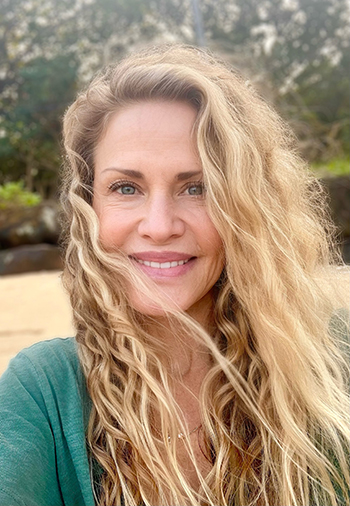Dr. Maureen L. Ellis =continues to share her sensitive and revealing story about her journey through life and how gluten affected her personally. She writes from her heart, has nothing less the pure intentions to share her story as a means to help. Please read Part I and Part II and get to know Dr. Maureen Ellis and see how her words may help you or someone you love and care about.
I think I must be like everyone else who is told to go gluten free as an adult, I thought, I can eat just a couple Cheese Its, and it won’t bother me, or a couple bites of a cookie, ice cream or whatever your favorite treat may be, but the truth is, you don’t feel better until you’re 100% free of the foods that make you sick. As soon as I eliminated all gluten, lactose, egg yolks and fatty foods from my diet I began to feel better and my diarrhea started to improve. However, my husband and I noticed that every Sunday I would get really sick again. We realized after a couple of weeks that there was gluten in the communion host, so that would be another issue to deal with, and one that was very difficult for my family to accept because of the emotion implications. Everybody felt sorry for me sitting the pew by myself as they went up for communion. In time, I think it bothered them more than me because I was getting to the root of my problems and feeling good again was the happier choice.
I will always remember my very first trip to the grocery store following my diagnosis; I bet it took me over two hours to shop. At first, my husband would drop me off at the grocery store and I would read every label and choose food items very carefully and then he would come back to pick me up. Almost four years later, I have found that the grocery stores in my city now label a lot of the gluten free products and continually add more products to the shelves. I have a few reliable online stores where I can get things I can’t get in the stores and every few months we take a trip to Raleigh, about an hour and a half away to hit my favorite Whole Foods store to stock up, which saves me on shipping costs.
At first, my new diet was strange to the whole family, and it was a big deal every night when we sat down to dinner. My husband and the kids would see what I was eating and evaluate exactly what it was, how many calories I was eating and how proud they were of me for making the commitment to a gluten free life. I felt like the center of attention every night and just wanted to feel normal. Whenever we would go out to dinner at a restaurant, I found that servers were fascinated by my food intolerances and would try anything to get me to order from their menu. Friends and extended family didn’t understand what gluten was and would feel offended when I couldn’t eat food they prepared. No matter how hard I tried to explain the situation, I found that some people just can’t comprehend that people with food intolerances aren’t being rude by turning down food, but they aren’t allowed to eat the food as a matter of life and death. Over time, the majority of our friends and family have accepted my situation and now my food has become a natural component of holidays and dinners out. For safety reasons, I take my own food when we go out or over to peoples’ house. My husband and I realized that every holiday and celebration includes food, so we made it our personal mission to change the atmosphere and make it less about food and more about the people or event. Slowly but surely, we are changing attitudes.
Once the doctors got my diet under control, I actually began to thrive; put on a little of the 35 lbs I had lost, and it looked like I was going to be able to regain my life back. I woke up on December 23, 2006 and decided to throw all of my medications in the trash and get on with my life. I didn’t tell anybody what I was doing, but couldn’t think of a better Christmas present to myself. I went through a tough time, because I had been on some serious painkillers, but knew I was really strong and could do it on my own with a holistic approach connecting mind, body and soul I started returning to campus for office hours and meetings on a regular basis, attending and presenting at conferences, and returning to a new normal life running around my kids and working out with a passion. It was really an exciting time for me as I felt like I had won the war. Unfortunately, I found that I had a disease that was much stronger than my will to be well.
Around August, 2007, while I was out running, I started noticing pain returning to my upper right quadrant. By mid-September, I was back at my doctor. She ordered numerous GI tests and started me back on pain killers. I lost my appetite, the diarrhea returned and my weight started dropping again. It looked like all my old symptoms were returning, which was a serious emotional blow. My local doctors felt my case was getting too complicated for them, so they referred me to a specialist in Chapel Hill, who referred me to a pancreatic specialist at Indiana University Medical Center. By March of 2008, I was bed-ridden and wondered if I would make it to my appointment to Indiana in April. By the time I got there, my pancreatic valve was 90% shut. The doctor was able to repair the valve, but told us he didn’t believe that was going to solve all my problems. Throughout the summer, my pancreas continued to cause lots of pain and eventually I had to go on synthetic enzymes. It was obvious by the start of the fall semester that I was not improving and I wouldn’t be able to return to campus to teach. On Thanksgiving weekend, the phone rang and I literally couldn’t get out of bed to answer it because my feet hurt so badly. I called the doctor immediately on Monday morning and he got me in to see a rheumatologist that week. He had also made arrangements for me to get back to the IU Medical Center for additional procedures. The test results came back the week before I left for the IU Medical Center that I had Systemic Lupus Erythematosus (SLE), which is an autoimmune disorder causing chronic inflammation. Autoimmune diseases are illnesses that occur when the body’s tissues are attacked by its own immune system. My specialist in Indiana tested my pancreatic juice quality and quantity, which came back very poor. He determined that the lupus was directly attacking my pancreas causing chronic pancreatitis. He prescribed stem cell therapy and started me on lupus treatment.
Around mid-March, I started developing memory loss and neurological symptoms, so my local specialist sent me to a neurologist for testing. The doctor found two veins affected in my brain, and started me on Aricept, a drug typically used for Alzheimer patients. However, there have been some pilot studies where it did work with central nervous system disorder lupus. The Aricept made a tremendous difference and allowed me to continue on with my job as a college professor. The side effects from the stem cell therapy took a toll on my body, but I did have about five good months, where I was thriving and felt more like myself than I had in several years. For the first time in a very long time I felt like I had control over my disease instead of it controlling me.
Unfortunately, this past December, all of my pancreatic symptoms began to return. My doctors are very frustrated because we are at the end of the line as far as pharmaceutical options. There aren’t any new drugs on the market to fight pancreatic lupus, so it is a matter of managing each symptom as it arises and getting lots of rest.
I have learned that the best thing I can do for myself and my family is to listen to my body. Whenever you suffer from a chronic, critical disease you have to rest when you’re tired because unlike the a
verage, healthy person, you can’t operate from a deficit of energy. If you get tired, you can’t catch up on lost sleep on the weekend. Unfortunately if you get overly tired during the week, you can get yourself into an ugly pattern where you could end up in the hospital. I am learning to say “no” and realize I’m not super woman, nor do I want to be her anymore, I just want to do my job and be the best wife and mother I can be. As far as living a happy gluten-free life – over time it has become a part of my life and I don’t think anything about it. I certainly don’t feel deprived, in a matter of fact, I feel far more fulfilled than I ever did eating full fat, gluten and lactose. I believe that God gave me this disease because 1) I can handle it and 2) it is my responsibility to teach others how you can live a happy, fulfilled life with a chronic, critical illness. Keeping a positive attitude goes a very long way to accepting whatever cards you are dealt and my doctors believe my attitude has allowed me to survive this ugly disease.
Thank you for sharing my journey with me, as I have really appreciated this opportunity. I hope you have learned from my experience that life is not about fretting about what you can’t eat but taking joy in all the wonderful opportunities you do have.
Dr. Maureen Ellis, Ph.D.
Business and Information Technologies Education Department
East Carolina University
Thank you maureen. Maureen has generously offered to share her continued story as time progresses. Check back for Part 4 on M 5th, or better yet sign up on the right hand column for regular updates. (this means you will get updates sent to you in case you are not familiar with this feature)
From our home to yours, Tina Turbin
If you have any questions or suggestions just email me at Info (at) TinaTurbin (dot) com.







